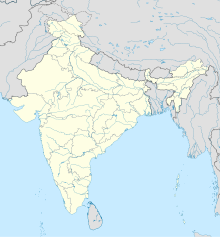Battle of Delhi (1803): Difference between revisions
mNo edit summary |
mNo edit summary |
||
| (145 intermediate revisions by more than 100 users not shown) | |||
| Line 1: | Line 1: | ||
| ⚫ | |||
| ⚫ | |||
{{Use dmy dates|date=October 2018}} |
|||
|image= |
|||
{{Use Indian English|date=October 2018}} |
|||
|caption= |
|||
| ⚫ | |||
| ⚫ | |||
| image = Battle of Delhi (1803) map.jpg |
|||
| ⚫ | |||
| caption = Map of the Battle of Delhi (1803) |
|||
| ⚫ | |||
| ⚫ | |||
|place= [[Delhi]], [[British India]] |
|||
| ⚫ | |||
| ⚫ | |||
| ⚫ | |||
| ⚫ | |||
| |
| place = [[Delhi]], [[Mughal Empire]] |
||
| coordinates = {{Coord|28|36|45|N|77|17|30|E|type:event_region:IN|display=it}} |
|||
| ⚫ | |||
| map_type = India Delhi#India |
|||
|commander2= [[General Bourquin]] |
|||
| map_relief = |
|||
| ⚫ | |||
| map_caption = Location within [[Delhi]] |
|||
| ⚫ | |||
| map_label = Delhi |
|||
|casualties1=400<br /> |
|||
| ⚫ | |||
|casualties2=2<br /> |
|||
| ⚫ | |||
| combatant2 = {{flagicon image|Flag of the Maratha Empire.svg}} [[Maratha Confederacy]] |
|||
| ⚫ | |||
| commander2 = [[Daulat Rao Scindia]] <br> Louis Bourquin |
|||
| ⚫ | |||
| ⚫ | |||
| casualties1 = Estimated 464–485 men killed or wounded<ref name=Naravane>{{Cite book |last=Naravane |first=M.S. |title=Battles of the Honorourable East India Company |publisher=A.P.H. Publishing Corporation |year=2014 |isbn=9788131300343 |pages=76–77}}</ref> |
|||
| casualties2 = Estimated 3,000 killed or wounded<ref name=Naravane/> |
|||
}} |
}} |
||
{{Campaignbox Second Anglo-Maratha War}} |
|||
The '''Battle of Delhi''' or '''Battle of Patparganj''' took place on 11 September 1803 during the [[Second Anglo-Maratha War]], between [[British East India Company]] troops of the [[Bombay Army]] under [[Gerard Lake, 1st Viscount Lake|General Lake]], and the [[Maratha Empire|Maratha]]s of [[Scindia]]'s army under General Louis Bourquin and Sardar Ravsaheb Wable. |
|||
{{unreferenced|date=May 2007}} |
|||
The '''Battle of Delhi''' took place on [[September 11]] [[1803]], between 4,500 [[United Kingdom|British]] troops under [[Gerard Lake, 1st Viscount Lake|General Lake]], and 19,000 [[Maratha]]s of [[Scindia]]'s army under [[General Bourquin]]. The Marathas occupied a strong position with the [[Jumna]] in their rear, and Lake, feigning a retreat, drew them from their lines, and then turning upon them drove them with the bayonet into the river, inflicting enormous losses upon them. The British lost 400 men. The battle increased British power and prestige in [[India]]. |
|||
==Events== |
|||
'''See also:''' |
|||
Bourquin had treacherously deserted his former friend [[Pierre Cuillier-Perron|General Perron]] and now commanded 1743 battalions of the latter's troops. The battle was fought at [[Muradabad|Mosadabad]], right across the [[Yamuna River]] from [[Humayun's Tomb]], also giving the battle its local name.{{cn|date=October 2023}} |
|||
| ⚫ | |||
The Marathas initially occupied a strong position with the Yamuna River in their rear. But, General Gerard Lake, feigning a retreat, drew them from their lines and then turning upon them drove them with the bayonet into the river, inflicting more losses upon them. Finally, the city of [[Delhi]] fell three days later. As a result, the control of the city of Delhi passed from the Marathas to the British.{{cn|date=October 2023}} |
|||
A monument was later erected at the site in [[Patparganj]], marked out by a surrounding ditch, commemorating Cornet Sanguine and the Company army soldiers who fell during the battle.{{cn|date=October 2023}} |
|||
==References== |
|||
{{Reflist}} |
|||
{{MarathaEmpire}} |
{{MarathaEmpire}} |
||
{{DEFAULTSORT:Delhi, Battle of 1803}} |
|||
{{Maratha-stub}} |
|||
[[Category:Conflicts in 1803]] |
[[Category:Conflicts in 1803]] |
||
[[Category:Battles involving the |
[[Category:Battles involving the Maratha Confederacy]] |
||
[[Category:Battles |
[[Category:Battles of the Second Anglo-Maratha War]] |
||
[[Category:1803 in India]] |
|||
[[Category:19th century in Delhi|Battle]] |
|||
[[Category:Battles involving the British East India Company]] |
|||
[[Category:Military history of Delhi]] |
|||
[[Category:September 1803 events]] |
|||
Latest revision as of 12:52, 14 October 2024
| Battle of Delhi | |||||||
|---|---|---|---|---|---|---|---|
| Part of the Second Anglo-Maratha War | |||||||
 Map of the Battle of Delhi (1803) | |||||||
| |||||||
| Belligerents | |||||||
|
|
| ||||||
| Commanders and leaders | |||||||
| Gerard Lake |
Daulat Rao Scindia Louis Bourquin | ||||||
| Strength | |||||||
| 4,500 | 17,000 | ||||||
| Casualties and losses | |||||||
| Estimated 464–485 men killed or wounded[1] | Estimated 3,000 killed or wounded[1] | ||||||
Location within Delhi | |||||||
The Battle of Delhi or Battle of Patparganj took place on 11 September 1803 during the Second Anglo-Maratha War, between British East India Company troops of the Bombay Army under General Lake, and the Marathas of Scindia's army under General Louis Bourquin and Sardar Ravsaheb Wable.
Events
[edit]Bourquin had treacherously deserted his former friend General Perron and now commanded 1743 battalions of the latter's troops. The battle was fought at Mosadabad, right across the Yamuna River from Humayun's Tomb, also giving the battle its local name.[citation needed]
The Marathas initially occupied a strong position with the Yamuna River in their rear. But, General Gerard Lake, feigning a retreat, drew them from their lines and then turning upon them drove them with the bayonet into the river, inflicting more losses upon them. Finally, the city of Delhi fell three days later. As a result, the control of the city of Delhi passed from the Marathas to the British.[citation needed]
A monument was later erected at the site in Patparganj, marked out by a surrounding ditch, commemorating Cornet Sanguine and the Company army soldiers who fell during the battle.[citation needed]
References
[edit]- ^ a b Naravane, M.S. (2014). Battles of the Honorourable East India Company. A.P.H. Publishing Corporation. pp. 76–77. ISBN 9788131300343.


